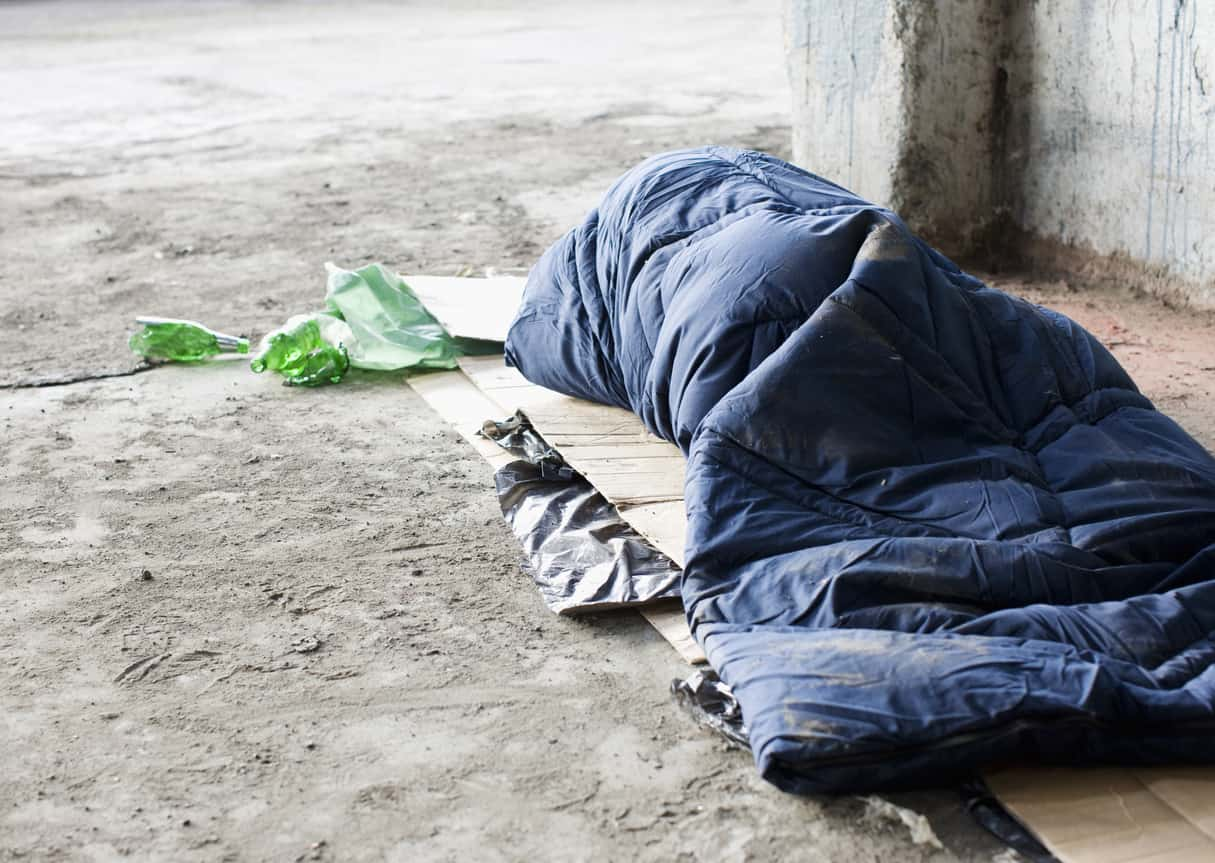
The scale of homelessness in the UK is very difficult to measure. There are many types of homelessness for a start – from the most visible (rough sleeping) to the ‘hidden’ homelessness of sofa surfing and temporary accommodation.
According to the Big Issue, however, an estimated 227,000 people were experiencing the worst forms of homelessness – such as sleeping rough, sleeping in vans or sheds, or being stuck in B&Bs – across England, Scotland and Wales in 2021.1 With the cost-of-living crisis and other pressures, these figures only look set to rise in the short to mid-term.
The scale of drug and alcohol addiction can also be difficult to quantify. Not everyone with an addiction or substance misuse problem is ‘in the system’ and seeking help. According to the charity Alcohol Change UK, there are estimated to be more than 600,000 dependent drinkers in England alone, less than 20% of whom are receiving any treatment.2
Drug abuse is even harder to measure. There were 268,390 adults in contact with drug and alcohol services from 2017 to 2018, with only 75,787 in treatment for alcohol alone.3 This means nearly 200,000 were in contact with other substances – and this does not take into account the vast amounts of people who misuse drugs and are not in contact with drug and alcohol services.
Relationship Between Drug and Alcohol Addiction and Homelessness
These large numbers, coupled with uncertainty in the estimates, make it difficult to get an accurate view of the relationship between alcohol and drug addiction and homelessness. There is certainly a well-established connection, though, with addiction and substance misuse levels being far higher in the homeless population than in the general population of the UK.
A 2019 report from the Advisory Council on the Misuse of Drugs (ACMD) found that a third (32%) of all deaths among homeless people in England in 2017 resulted from drug poisoning. This is compared to just 1% of the general population.4
The relationship can also be complex and difficult to deal with. In some cases, addiction and substance misuse issues already existed and contributed to the person becoming homeless. In others, people take drugs or alcohol to alleviate the misery and challenges of homelessness. This is almost always counter-productive and can make the situation much worse.
The ACMS report also stated that treating homeless people for drug misuse is extremely difficult unless their housing needs are also addressed at the same time. It noted that the needs of homeless people, especially rough sleepers, were not always well catered to by mainstream benefits, health and social care, and some drug services.
Can Addiction Cause Homelessness?
Homelessness can have many causes. A lack of affordable housing, poverty, unemployment and difficulties with the cost of living can all help push people into homelessness, as can some life events. Women fleeing an abusive relationship may find themselves homeless.
People may become homeless when they leave prison, care or the army. Divorce and breakups, physical or mental health problems, losing a job, and other events and situations can also contribute. As mentioned, many people who find themselves homeless will turn to drugs or alcohol and may develop substance misuse issues up to and including addiction.
Addiction and substance misuse can contribute to homelessness, however. Homelessness charity Crisis said that in 2013-15, more than a quarter (27%) of their clients reported problematic drug or alcohol use. It adds that two-thirds of homeless people cite drug or alcohol use as a reason for first becoming homeless, suggesting the true number struggling with substance misuse is far higher. It adds that people who use drugs are seven times more likely to be homeless than those who do not.5
Mental Health and Addiction
There are also long-established links between mental health and homelessness and mental health and addiction. Again, these relationships can be quite complex. Dual diagnosis, for example, is when people are simultaneously identified as having serious mental health and substance misuse issues. This could consist of the following:
- A mental illness that has led to substance misuse
- A substance misuse problem that has led to a mental illness
- Two initially unrelated disorders (a mental illness and a substance misuse problem) that interact with and exacerbate each other
According to the National Institute for Health and Care Excellence (NICE), UK studies have reported dual diagnosis rates of 20–37% across all mental health settings and 6–15% in addiction settings. This means that around a third of those treated primarily for serious mental health issues also have an addiction. At the same time, a significant number of people being treated primarily for addiction also have serious mental health conditions.6
Mental health issues are also common in people who are homeless. Crisis found that 45% of people experiencing homelessness have been diagnosed with a mental health issue, rising to 8 out of 10 people sleeping rough.8
Again, there are cases where a mental health condition contributed to homelessness. Still, there are other cases where it is the state of homelessness that triggers or exacerbates the mental health problem. Throw drug and alcohol misuse into the mix; the risks are even higher.
Common Drugs Used on the Streets
Rough sleepers commonly use alcohol as it is relatively cheap and accessible. There are also increased levels of usage of drugs, including heroin and crack cocaine, among the homeless as opposed to the general population.
A 2019 study on drug use among the homeless in Edinburgh and Sheffield also found increased usage of New Psychoactive Substances (NPS) and prescription drugs. NPS include synthetic cannabinoids (commonly known as ‘spice’), while prescription drugs commonly used on eth streets include Pregabalin, Gabapentin, Xanax and Valium.8
Resources for the Homeless
There are a number of resources for people who are homeless. The Pavement magazine lists shelters; you can seek help from your local council or contact Citizens Advice. Specialist organisations like Shelter and Crisis UK can also help and will be able to signpost towards further resources and organisations.
Posted on Friday, November 11th, 2022 at 9:53 am in Addiction, Latest News.






 Call Us
Call Us Contact Us
Contact Us